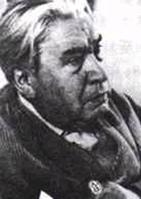| 雅罗斯拉夫·塞弗尔特 | |||||
Read works of Jaroslav Seifert at 诗海 | |||||
Born in Žižkov, a suburb of Prague in what was then part of Austria-Hungary, his first collection of poems was published in 1921. He was a member of the Communist Party, the editor of a number of communist newspapers and magazines - Rovnost, Srsatec, and Reflektor - and the employee of a communist publishing house.
During the 1920s he was considered a leading representative of the Czechoslovakian artistic avant-garde. He was one of the founders of the journal Devětsil.
In March 1929, he and six other important communist writers left the Communist Party for signing a manifesto protesting against Bolshevik tendencies in the new leadership of the Communist Party of Czechoslovakia.
He subsequently worked as a journalist in the social-democratic and trade union press during the 1930s and 1940s.
In 1949 Seifert left journalism and began to devote himself exclusively to literature. His poetry was awarded important state prizes in 1936, 1955, and 1968, and in 1967 he was designated National Artist. He was the official Chairman of the Czechoslovak Writer's Union for several years (1968-70).
In 1977 he was one of the signatories of Charter 77 in opposition to the repressive regime of the time.
Seifert was awarded the Nobel Prize in Literature in 1984. Due to bad health, he was not present at the award ceremony, and so his daughter received the Nobel Prize in his name. (Some sources say, that the government didn't let him go accept the prize.) Even though it was a matter of great importance, there was only a brief remark on the award in the state-controlled media. He died in 1986 and was buried at the municipal cemetery in Kralupy nad Vltavou. His burial was marked by a high presence of secret police, who tried to suppress any hint of dissent on the part of mourners.
